外研版英语中考语言基础知识梳理与训练 第11课 八年级下册 Modules 1—2
文档属性
| 名称 | 外研版英语中考语言基础知识梳理与训练 第11课 八年级下册 Modules 1—2 | 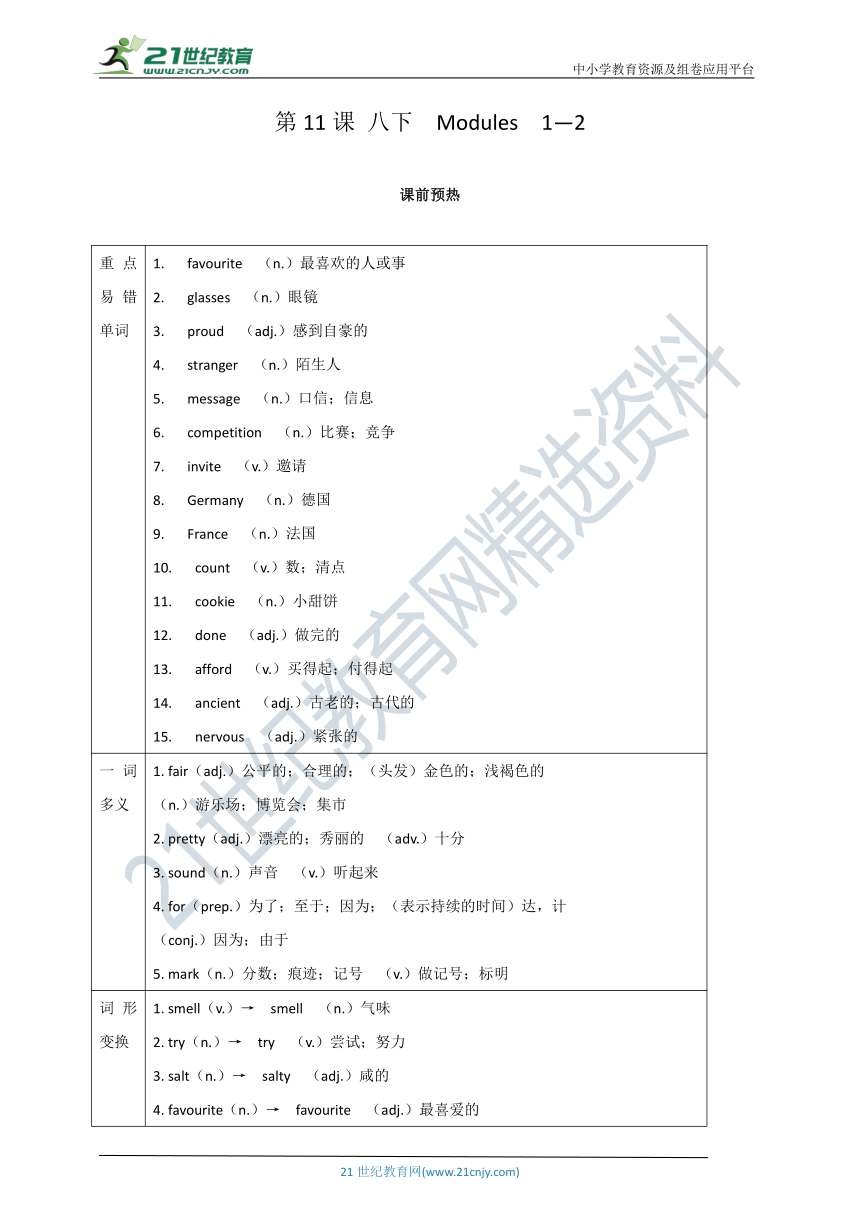 | |
| 格式 | doc | ||
| 文件大小 | 1.3MB | ||
| 资源类型 | 试卷 | ||
| 版本资源 | 外研版 | ||
| 科目 | 英语 | ||
| 更新时间 | 2022-02-06 18:52:02 | ||
图片预览

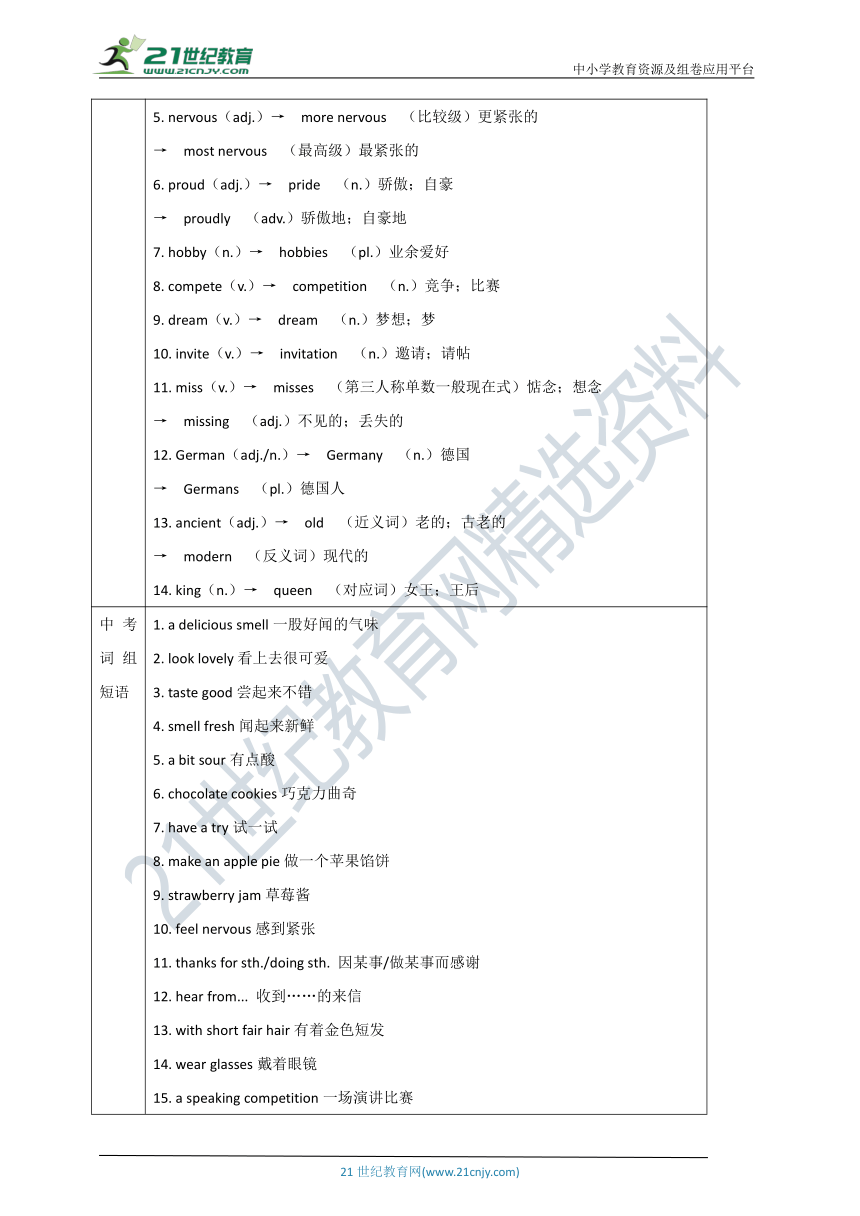
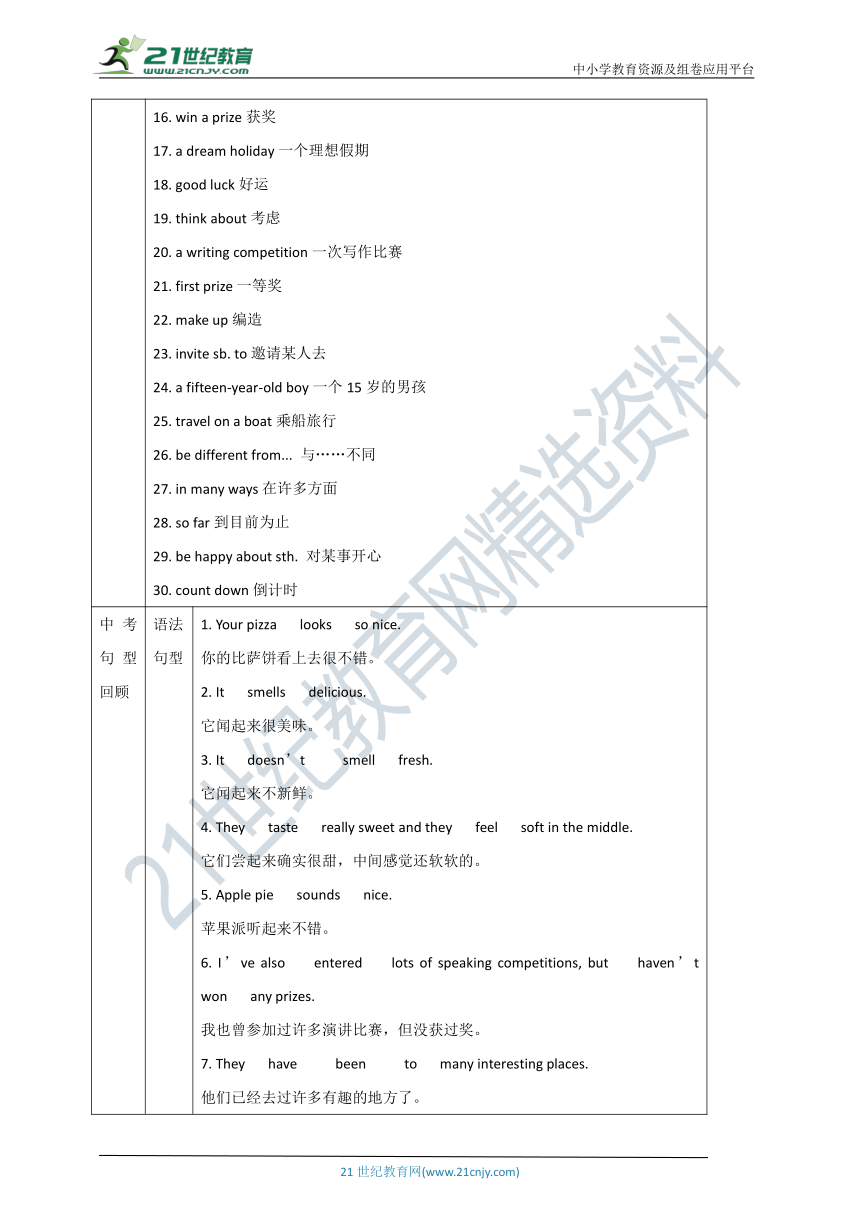
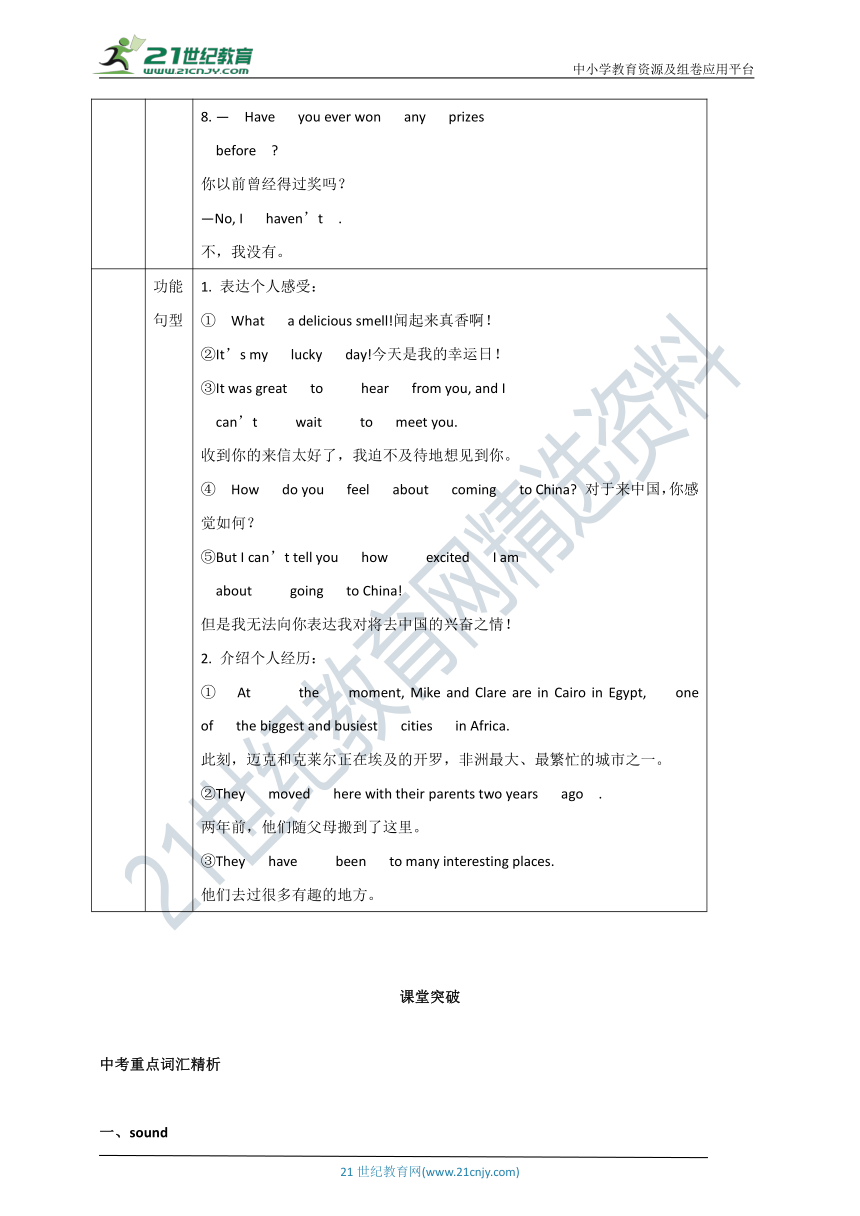
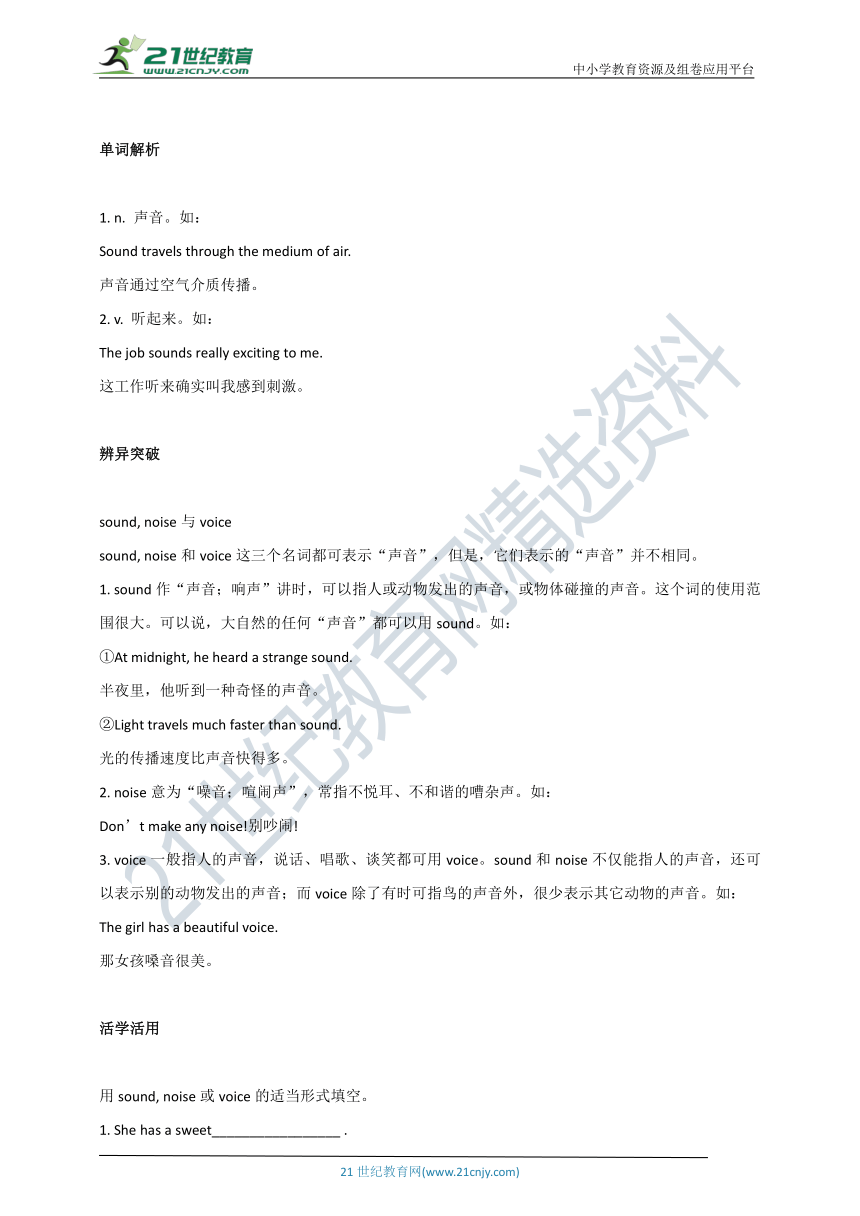
文档简介
中小学教育资源及组卷应用平台
第11课 八下 Modules 1—2
课前预热
重点易错单词 1. favourite (n.)最喜欢的人或事2. glasses (n.)眼镜3. proud (adj.)感到自豪的4. stranger (n.)陌生人5. message (n.)口信;信息6. competition (n.)比赛;竞争7. invite (v.)邀请8. Germany (n.)德国9. France (n.)法国10. count (v.)数;清点11. cookie (n.)小甜饼12. done (adj.)做完的13. afford (v.)买得起;付得起14. ancient (adj.)古老的;古代的15. nervous (adj.)紧张的
一词多义 1. fair(adj.)公平的;合理的;(头发)金色的;浅褐色的(n.)游乐场;博览会;集市2. pretty(adj.)漂亮的;秀丽的 (adv.)十分 3. sound(n.)声音 (v.)听起来4. for(prep.)为了;至于;因为;(表示持续的时间)达,计(conj.)因为;由于5. mark(n.)分数;痕迹;记号 (v.)做记号;标明
词形变换 1. smell(v.)→ smell (n.)气味2. try(n.)→ try (v.)尝试;努力3. salt(n.)→ salty (adj.)咸的4. favourite(n.)→ favourite (adj.)最喜爱的5. nervous(adj.)→ more nervous (比较级)更紧张的→ most nervous (最高级)最紧张的6. proud(adj.)→ pride (n.)骄傲;自豪→ proudly (adv.)骄傲地;自豪地7. hobby(n.)→ hobbies (pl.)业余爱好8. compete(v.)→ competition (n.)竞争;比赛9. dream(v.)→ dream (n.)梦想;梦10. invite(v.)→ invitation (n.)邀请;请帖11. miss(v.)→ misses (第三人称单数一般现在式)惦念;想念→ missing (adj.)不见的;丢失的12. German(adj./n.)→ Germany (n.)德国→ Germans (pl.)德国人13. ancient(adj.)→ old (近义词)老的;古老的→ modern (反义词)现代的14. king(n.)→ queen (对应词)女王;王后
中考词组短语 1. a delicious smell一股好闻的气味2. look lovely看上去很可爱3. taste good尝起来不错4. smell fresh闻起来新鲜5. a bit sour有点酸6. chocolate cookies巧克力曲奇7. have a try试一试8. make an apple pie做一个苹果馅饼9. strawberry jam草莓酱10. feel nervous感到紧张11. thanks for sth./doing sth. 因某事/做某事而感谢12. hear from... 收到……的来信13. with short fair hair有着金色短发14. wear glasses戴着眼镜15. a speaking competition一场演讲比赛16. win a prize获奖17. a dream holiday一个理想假期18. good luck好运19. think about考虑20. a writing competition一次写作比赛21. first prize一等奖22. make up编造23. invite sb. to邀请某人去24. a fifteen-year-old boy一个15岁的男孩25. travel on a boat乘船旅行26. be different from... 与……不同27. in many ways在许多方面28. so far到目前为止29. be happy about sth. 对某事开心30. count down倒计时
中考句型回顾 语法句型 1. Your pizza looks so nice.你的比萨饼看上去很不错。2. It smells delicious.它闻起来很美味。3. It doesn’t smell fresh.它闻起来不新鲜。4. They taste really sweet and they feel soft in the middle.它们尝起来确实很甜,中间感觉还软软的。5. Apple pie sounds nice. 苹果派听起来不错。6. I’ve also entered lots of speaking competitions, but haven’t won any prizes.我也曾参加过许多演讲比赛,但没获过奖。7. They have been to many interesting places.他们已经去过许多有趣的地方了。8. — Have you ever won any prizes before 你以前曾经得过奖吗?—No, I haven’t . 不,我没有。
功能句型 1. 表达个人感受:① What a delicious smell!闻起来真香啊!②It’s my lucky day!今天是我的幸运日!③It was great to hear from you, and I can’t wait to meet you.收到你的来信太好了,我迫不及待地想见到你。④ How do you feel about coming to China 对于来中国,你感觉如何?⑤But I can’t tell you how excited I am about going to China!但是我无法向你表达我对将去中国的兴奋之情!2. 介绍个人经历:① At the moment, Mike and Clare are in Cairo in Egypt, one of the biggest and busiest cities in Africa.此刻,迈克和克莱尔正在埃及的开罗,非洲最大、最繁忙的城市之一。②They moved here with their parents two years ago . 两年前,他们随父母搬到了这里。③They have been to many interesting places.他们去过很多有趣的地方。
课堂突破
中考重点词汇精析
一、sound
单词解析
1. n. 声音。如:
Sound travels through the medium of air.
声音通过空气介质传播。
2. v. 听起来。如:
The job sounds really exciting to me.
这工作听来确实叫我感到刺激。
辨异突破
sound, noise与voice
sound, noise和voice这三个名词都可表示“声音”,但是,它们表示的“声音”并不相同。
1. sound作“声音;响声”讲时,可以指人或动物发出的声音,或物体碰撞的声音。这个词的使用范围很大。可以说,大自然的任何“声音”都可以用sound。如:
①At midnight, he heard a strange sound.
半夜里,他听到一种奇怪的声音。
②Light travels much faster than sound.
光的传播速度比声音快得多。
2. noise意为“噪音;喧闹声”,常指不悦耳、不和谐的嘈杂声。如:
Don’t make any noise!别吵闹!
3. voice一般指人的声音,说话、唱歌、谈笑都可用voice。sound和noise不仅能指人的声音,还可以表示别的动物发出的声音;而voice除了有时可指鸟的声音外,很少表示其它动物的声音。如:
The girl has a beautiful voice.
那女孩嗓音很美。
活学活用
用sound, noise或voice的适当形式填空。
1. She has a sweet_________________ .
2. The_________________ woke me up.
3._________________ travels slower than light.
4. The_________________ of traffic kept him awake.
5. I lost my_________________ because of a bad cold.
6. Don’t make a_________________ like a pig. It’s terrible.
7. The thought you came up with_________________ good.
8. When the teacher came into the classroom, our monitor spoke in a loud_________________ , “Stand up!”
二、for
单词解析
1. prep. 为了;至于;因为;(表示持续的时间)达,计;(表示对象、用途等)给,对,供;(表示距离)。如:
①There’s a letter for you. 有你的一封信。
②Are you learning English for pleasure or for your work
你学英语是出于消遣还是为了工作?
③He got an award for bravery.
他因英勇受奖。
④I’m going away for a few days.
我要离开几天。
2. conj. 因为;由于。如:
I believed her─for surely she would not lie to me.
我相信她的话——因为她肯定不会向我撒谎。
辨异突破
because, as, for与since
这几个词都是表示“原因”的连词,语气由强至弱依次为:because→since→as→for;其中because, since, as均为从属连词,引导原因状语从句;而for 是并列连词,引导并列句。
1. because conj. 因为。语气最强,表示因果关系,通常用来回答由why引导的疑问句。由because引导的分句置于句首时,须用逗号与主句隔开,置于句末时则不用隔开。如:
①Because the traffic was so busy, she failed to arrive at the station on time.
因为路上交通太拥挤,她没能准时赶到车站。
②He came back late because there was something wrong with his car.
他回来晚了,因为汽车出了故障。
2. as conj. 因为;由于。如果所述理由是明显的或者已知的,则用as较because更为合适。如:
①As it’s raining, you’d better stay at home.
由于天在下雨,你最好呆在家里。
②He puts the ice cream into the fridge immediately, as it melts easily.
他马上把冰激凌放进冰箱,因为它很容易化掉。
3. for conj. [正式]因为。for是并列连词,由它引导的分句表示补充说明性的理由,通常只能置于句末,且必须用逗号与前面的分句隔开。如:
①He must have passed this way, for here are his footprints.
他肯定是从这条路走过去的,这里有他的脚印。
②He has to work hard, for he wants to support his family.
因为要养家糊口,他必须努力工作。
4. since conj. 因为;既然。当所述原因是已知的客观事实或被当作推断的理由时用 since,语气略强于as。如:
①Since he is absent, let’s begin.
既然他不在,我们就开始吧。
②Susan must have come back home, since her coat is not in the wardrobe.
苏珊肯定回过家,因为她挂在衣橱里的外套不见了。
活学活用
根据句意,选用for, because, since和as填空。
1. —Why is she absent
—_________________ she is sick.
2. What did you do that_________________
3. There’s no need_________________ you to go.
4._________________ everyone is here, let’s start.
5. Bake the cake_________________ at least 40 minutes.
6. The road went on_________________ miles and miles.
7. I could not go,_________________ I was ill.
8. I’m warning you_________________ the last time─stop talking!
9._________________ I understood very little Japanese, I couldn’t follow the conversation.
三、enter
单词解析
vt. 进入。如:
Someone entered the room behind me.
有人跟着我进了屋。
名词形式:entry进入(指行动);进入(指权利等);参与,加入(指权利、机会)。
辨异突破
enter, join, join in, attend与take part in
1. enter是动词,意为“进入;参加;开始;登记”。当enter表示“进入”一个具体处所或加入某个组织而成为其中一员,后不加介词。常相当于go/come into。如:
①She entered the room and closed the door.
她走进了房间,关上了门。
②Have you ever entered any competitions
你曾经参加过一些比赛吗?
2. join指的是加入组织、团体、党派等,有作为其中的一个成员的含义。如:join the club参加俱乐部;join the Party入党;join the army参军。
join的固定搭配:join sb. in (doing) sth. (和某人一起参加某活动)。如:
Will you join us in the discussion
你要和我们一起参与讨论吗?
3. join in 指的是加入一种具体活动。如:
join in the research加入研究;join in the group singing参加小组演唱(注意:有别于join the singing group,因为the singing group是个组织)等。
4. attend 指的是参加会议、课程、婚礼、葬礼等。如:
attend the meeting参加会议;attend the class上课。
5. take part in 指参加会议或群众性活动等,着重说明句子主语参加该项活动并在活动中发挥作用。如:
I take part in the school sports meeting every year. 我每年都参加校运动会。
活学活用
用enter, join, join in, take part in或attend的适当形式填空。
1. He_________________ a college last year.
2. Everyone_________________ the sports meeting last week.
3. It’s two years since he_________________ the club.
4. Come along and_________________ the ball game.
5. He’ll_________________ an important meeting tomorrow.
中考重点句型精析
一、It smells delicious. 它闻起来很美味。
句型解析
在上面的句子中,smell是系动词。
系动词是英语动词中的一种,可作谓语,其后一般接形容词或名词等作表语。含系动词和其表语的结构我们称为“系表结构”。
系动词主要分为:
1. 状态系动词。
用来表示主语状态,只有be动词一种。如:
He is a teacher. 他是一名教师。(is与补足语一起说明主语的身份)
2. 持续系动词。
用来表示主语继续或保持一种状况或态度,主要有keep, remain, stay, stand等。如:
He stood still when he saw a bear.
当他看到一头熊时,他保持不动。
3. 表像系动词。
用来表示“看起来像”这一概念,主要有seem, appear等。如:
He seems very sad. 他看起来很伤心。
4. 感官系动词。
感官系动词主要有feel, smell, sound, taste, look等。如:
This flower smells very sweet.
这朵花闻起来很香。
5. 变化系动词。
这些系动词表示主语变成什么样,变化系动词主要有become, grow, turn, fall, get, go, come, run等。如:
She grew rich within a short time.
她没多长时间就富了。
6. 终止系动词。
表示主语已终止动作,主要有prove, turn out等,意为“证实”、“变成”。如:
①The rumour proved false.
这谣言证实有误。
②His plan turned out a success.
他的计划成功了。(turn out表终止性结果)
温馨提示:有些系动词的词性很丰富。如look除了作为系动词表示“看起来”之外,还有实义动词“看”,名词“表情”等意思;grow除了作为系动词外,还有实义动词“成长;种植;生长”之意。
活学活用
填入适当的词或用所给词的适当形式填空。
1. My favourite sports_________________ swimming and running.
2. He looks_________________ (tiring).
3. In the end, the teacher became_________________ (anger).
4. The music sounds_________________ (beauty).
5. My idea is_________________ (go) there tomorrow.
6. The skirt_________________ (not) feel soft. I don’t like it.
7. The soup tastes_________________ (well).
二、I’ve also entered lots of speaking competitions.
我也参加过许多演讲比赛。
句型解析
此类句子属于现在完成时。
1. Have you ever done sth. 表示“你曾经做过某事吗?”。此句型常用来询问他人是否曾经做过某事。如:
Have you ever made dumplings
你曾经包过饺子吗?
2. 现在完成时的基本用法:
(1)表示迄今为止的经历,也许发生过一次,也许多次。如:
①I have travelled to Beijing.
我曾经去北京旅行过。(我从出生到现在已经有过去北京的经历)
②I have never seen the sea.
我从未见过大海。(从出生到现在我没有见过大海)
(2)表示过去发生的动作或刚刚完成的动作对现在的影响。如:
①I have finished my work.
我把工作做完了。(现在手头没工作了)
②I have just cleaned the kitchen.
我刚刚把厨房打扫干净。(厨房现在是干净的)
3. 现在完成时的一般疑问句,是把have/has提至句首,句末加“ ”。否定回答时,在have/has后加not。如:
—Have you finished your work
你的工作完成了吗?
—Yes, I have./No, I haven’t.
是的,完成了。/不,还没完成。
4. before可作介词、副词和连词。before作副词单独使用时,意为“以前”,常和完成时连用。如:
Has Tom come to your home before
汤姆以前来过你家吗?
表示“以前”还有副词ago,它指从说话时算起的若干时间以前,常与一般过去时连用,不能与完成时连用。如:
I came here a year ago.
我一年前来过这儿。
活学活用
填入适当的词或用所给词的适当形式填空。
1. —Is Tony in the classroom
—No, he_________________ (go) to the science building.
2. —Sam,_________________ you ever_________________ (try) Chinese dumplings
—Yes, I often_________________ (eat) them. They are delicious.
3. —Allen knows a lot about the outside world.
—I agree. That’s because he_________________ (travel) to many countries.
4. I like English culture, but I have_________________ been to England.
5. Although Paul has been in Beijing for a year, he_______________ (not visit) the nature park.
6. I_________________ (go) to Dalian 2 years ago.
7. He_________________ (see) the film five times.
8._________________ you ever visited Hangzhou before
当堂检测
一、选词填空
用方框中所给词语的适当形式填空。每词限用一次。
invite dream ancient afford make up
1. Jack knew that playing basketball for the NBA was only a_________________ .
2. We don’t have enough money. We can only_________________ to buy a small house.
3. I didn’t believe what Tom said. I thought he_________________ all the things.
4. In the beginning, I didn’t want to_________________ her to my party, but finally I changed my mind.
5. Mencius, also known by his birth name Meng Ke, was a famous thinker in_________________ times.
二、单词拼写
1. You look_________________ (可爱的) in that dress.
2. She can_________________ (数) up to 10 in Italian.
3. I don’t think I’ve_________________ (曾经) been here before.
4. A police officer was_________________ (派遣) to Ryan’s home.
5. He won first prize at the Leeds Piano_________________(比赛).
6. Susan’s_________________ (爱好) include reading, cooking and drama.
7. There were strange_________________ (声音) coming from the next room.
8. The plane_________________ (移动) slowly along the runway, and then stopped.
9. His past record is certainly something to be_________________(自豪的) of.
10. She was so_________________ (紧张的) about her exams that she couldn’t sleep.
三、语法填空
阅读下面短文,在空白处填入一个适当的词,或填入括号中所给单词的正确形式。
When I was 27 years old, I worked in an office in San Francisco. I did my job well and my future 1_________________(be) bright. Although I was alone in the world, I was still very happy.
On Saturday afternoons I 2_________________(not) work. I sailed my little boat on San Francisco Bay. One Saturday afternoon, I sailed out too far. It was so windy 3_________________ my boat was pushed into the Pacific Ocean.
That night, when I lost all hope, a British ship took 4_________________(I) on board. The ship, which was sailing to London, was very small, but the journey was long. I worked as a sailor to pay5_________________ my trip. When I arrived in London, my clothes were dirty. I had only one dollar in my pocket. With the money, I ate and 6_________________(sleep) for the first twenty-four hours. During the next twenty-four hours, I didn’t eat or sleep. At about ten o’clock the following morning, I went to Portland. I saw a child walking past, holding a big pear. The child bit one small piece and then threw 7_________________ pear onto the street.
I was very hungry and I really wanted that pear. Every time I tried 8_________________(get) it, someone passed by and looked at me. I tried again and again, 9_________________ the same thing happened. I decided to get it and not to worry about the people who saw me. At that moment, a gentleman opened a window behind me and said, “Come in here, please.” 10_________________ a great surprise! I entered the room and stared at the breakfast on the table.
参考答案
第11课 八下 Modules 1—2
课堂突破
【中考重点词汇精析】
一、1. voice 2. noise 3. Sound 4. noises/noise 5. voice
6. noise 7. sounds 8. voice
二、1. Because 2. for 3. for 4. Since 5. for 6. for
7. for/because 8. for 9. Since
三、1. entered 2. took part in 3. joined 4. join in
5. attend
【中考重点句型精析】
一、1. are 2. tired 3. angry 4. beautiful 5. to go
6. doesn’t/does not 7. good
二、1. has gone 2. have, tried, eat 3. has travelled 4. never
5. hasn’t visited/has not visited 6. went 7. has seen 8. Have
当堂检测
一、1. dream 2. afford 3. made up 4. invite 5. ancient
二、1. lovely 2. count 3. ever 4. sent 5. Competition
6. hobbies 7. sounds 8. moved 9. proud 10. nervous
三、1. was 2. didn’t 3. that 4. me 5. for 6. slept 7. the
8. to get 9. but 10. What
21世纪教育网 www.21cnjy.com 精品试卷·第 2 页 (共 2 页)
HYPERLINK "http://21世纪教育网(www.21cnjy.com)
" 21世纪教育网(www.21cnjy.com)
第11课 八下 Modules 1—2
课前预热
重点易错单词 1. favourite (n.)最喜欢的人或事2. glasses (n.)眼镜3. proud (adj.)感到自豪的4. stranger (n.)陌生人5. message (n.)口信;信息6. competition (n.)比赛;竞争7. invite (v.)邀请8. Germany (n.)德国9. France (n.)法国10. count (v.)数;清点11. cookie (n.)小甜饼12. done (adj.)做完的13. afford (v.)买得起;付得起14. ancient (adj.)古老的;古代的15. nervous (adj.)紧张的
一词多义 1. fair(adj.)公平的;合理的;(头发)金色的;浅褐色的(n.)游乐场;博览会;集市2. pretty(adj.)漂亮的;秀丽的 (adv.)十分 3. sound(n.)声音 (v.)听起来4. for(prep.)为了;至于;因为;(表示持续的时间)达,计(conj.)因为;由于5. mark(n.)分数;痕迹;记号 (v.)做记号;标明
词形变换 1. smell(v.)→ smell (n.)气味2. try(n.)→ try (v.)尝试;努力3. salt(n.)→ salty (adj.)咸的4. favourite(n.)→ favourite (adj.)最喜爱的5. nervous(adj.)→ more nervous (比较级)更紧张的→ most nervous (最高级)最紧张的6. proud(adj.)→ pride (n.)骄傲;自豪→ proudly (adv.)骄傲地;自豪地7. hobby(n.)→ hobbies (pl.)业余爱好8. compete(v.)→ competition (n.)竞争;比赛9. dream(v.)→ dream (n.)梦想;梦10. invite(v.)→ invitation (n.)邀请;请帖11. miss(v.)→ misses (第三人称单数一般现在式)惦念;想念→ missing (adj.)不见的;丢失的12. German(adj./n.)→ Germany (n.)德国→ Germans (pl.)德国人13. ancient(adj.)→ old (近义词)老的;古老的→ modern (反义词)现代的14. king(n.)→ queen (对应词)女王;王后
中考词组短语 1. a delicious smell一股好闻的气味2. look lovely看上去很可爱3. taste good尝起来不错4. smell fresh闻起来新鲜5. a bit sour有点酸6. chocolate cookies巧克力曲奇7. have a try试一试8. make an apple pie做一个苹果馅饼9. strawberry jam草莓酱10. feel nervous感到紧张11. thanks for sth./doing sth. 因某事/做某事而感谢12. hear from... 收到……的来信13. with short fair hair有着金色短发14. wear glasses戴着眼镜15. a speaking competition一场演讲比赛16. win a prize获奖17. a dream holiday一个理想假期18. good luck好运19. think about考虑20. a writing competition一次写作比赛21. first prize一等奖22. make up编造23. invite sb. to邀请某人去24. a fifteen-year-old boy一个15岁的男孩25. travel on a boat乘船旅行26. be different from... 与……不同27. in many ways在许多方面28. so far到目前为止29. be happy about sth. 对某事开心30. count down倒计时
中考句型回顾 语法句型 1. Your pizza looks so nice.你的比萨饼看上去很不错。2. It smells delicious.它闻起来很美味。3. It doesn’t smell fresh.它闻起来不新鲜。4. They taste really sweet and they feel soft in the middle.它们尝起来确实很甜,中间感觉还软软的。5. Apple pie sounds nice. 苹果派听起来不错。6. I’ve also entered lots of speaking competitions, but haven’t won any prizes.我也曾参加过许多演讲比赛,但没获过奖。7. They have been to many interesting places.他们已经去过许多有趣的地方了。8. — Have you ever won any prizes before 你以前曾经得过奖吗?—No, I haven’t . 不,我没有。
功能句型 1. 表达个人感受:① What a delicious smell!闻起来真香啊!②It’s my lucky day!今天是我的幸运日!③It was great to hear from you, and I can’t wait to meet you.收到你的来信太好了,我迫不及待地想见到你。④ How do you feel about coming to China 对于来中国,你感觉如何?⑤But I can’t tell you how excited I am about going to China!但是我无法向你表达我对将去中国的兴奋之情!2. 介绍个人经历:① At the moment, Mike and Clare are in Cairo in Egypt, one of the biggest and busiest cities in Africa.此刻,迈克和克莱尔正在埃及的开罗,非洲最大、最繁忙的城市之一。②They moved here with their parents two years ago . 两年前,他们随父母搬到了这里。③They have been to many interesting places.他们去过很多有趣的地方。
课堂突破
中考重点词汇精析
一、sound
单词解析
1. n. 声音。如:
Sound travels through the medium of air.
声音通过空气介质传播。
2. v. 听起来。如:
The job sounds really exciting to me.
这工作听来确实叫我感到刺激。
辨异突破
sound, noise与voice
sound, noise和voice这三个名词都可表示“声音”,但是,它们表示的“声音”并不相同。
1. sound作“声音;响声”讲时,可以指人或动物发出的声音,或物体碰撞的声音。这个词的使用范围很大。可以说,大自然的任何“声音”都可以用sound。如:
①At midnight, he heard a strange sound.
半夜里,他听到一种奇怪的声音。
②Light travels much faster than sound.
光的传播速度比声音快得多。
2. noise意为“噪音;喧闹声”,常指不悦耳、不和谐的嘈杂声。如:
Don’t make any noise!别吵闹!
3. voice一般指人的声音,说话、唱歌、谈笑都可用voice。sound和noise不仅能指人的声音,还可以表示别的动物发出的声音;而voice除了有时可指鸟的声音外,很少表示其它动物的声音。如:
The girl has a beautiful voice.
那女孩嗓音很美。
活学活用
用sound, noise或voice的适当形式填空。
1. She has a sweet_________________ .
2. The_________________ woke me up.
3._________________ travels slower than light.
4. The_________________ of traffic kept him awake.
5. I lost my_________________ because of a bad cold.
6. Don’t make a_________________ like a pig. It’s terrible.
7. The thought you came up with_________________ good.
8. When the teacher came into the classroom, our monitor spoke in a loud_________________ , “Stand up!”
二、for
单词解析
1. prep. 为了;至于;因为;(表示持续的时间)达,计;(表示对象、用途等)给,对,供;(表示距离)。如:
①There’s a letter for you. 有你的一封信。
②Are you learning English for pleasure or for your work
你学英语是出于消遣还是为了工作?
③He got an award for bravery.
他因英勇受奖。
④I’m going away for a few days.
我要离开几天。
2. conj. 因为;由于。如:
I believed her─for surely she would not lie to me.
我相信她的话——因为她肯定不会向我撒谎。
辨异突破
because, as, for与since
这几个词都是表示“原因”的连词,语气由强至弱依次为:because→since→as→for;其中because, since, as均为从属连词,引导原因状语从句;而for 是并列连词,引导并列句。
1. because conj. 因为。语气最强,表示因果关系,通常用来回答由why引导的疑问句。由because引导的分句置于句首时,须用逗号与主句隔开,置于句末时则不用隔开。如:
①Because the traffic was so busy, she failed to arrive at the station on time.
因为路上交通太拥挤,她没能准时赶到车站。
②He came back late because there was something wrong with his car.
他回来晚了,因为汽车出了故障。
2. as conj. 因为;由于。如果所述理由是明显的或者已知的,则用as较because更为合适。如:
①As it’s raining, you’d better stay at home.
由于天在下雨,你最好呆在家里。
②He puts the ice cream into the fridge immediately, as it melts easily.
他马上把冰激凌放进冰箱,因为它很容易化掉。
3. for conj. [正式]因为。for是并列连词,由它引导的分句表示补充说明性的理由,通常只能置于句末,且必须用逗号与前面的分句隔开。如:
①He must have passed this way, for here are his footprints.
他肯定是从这条路走过去的,这里有他的脚印。
②He has to work hard, for he wants to support his family.
因为要养家糊口,他必须努力工作。
4. since conj. 因为;既然。当所述原因是已知的客观事实或被当作推断的理由时用 since,语气略强于as。如:
①Since he is absent, let’s begin.
既然他不在,我们就开始吧。
②Susan must have come back home, since her coat is not in the wardrobe.
苏珊肯定回过家,因为她挂在衣橱里的外套不见了。
活学活用
根据句意,选用for, because, since和as填空。
1. —Why is she absent
—_________________ she is sick.
2. What did you do that_________________
3. There’s no need_________________ you to go.
4._________________ everyone is here, let’s start.
5. Bake the cake_________________ at least 40 minutes.
6. The road went on_________________ miles and miles.
7. I could not go,_________________ I was ill.
8. I’m warning you_________________ the last time─stop talking!
9._________________ I understood very little Japanese, I couldn’t follow the conversation.
三、enter
单词解析
vt. 进入。如:
Someone entered the room behind me.
有人跟着我进了屋。
名词形式:entry进入(指行动);进入(指权利等);参与,加入(指权利、机会)。
辨异突破
enter, join, join in, attend与take part in
1. enter是动词,意为“进入;参加;开始;登记”。当enter表示“进入”一个具体处所或加入某个组织而成为其中一员,后不加介词。常相当于go/come into。如:
①She entered the room and closed the door.
她走进了房间,关上了门。
②Have you ever entered any competitions
你曾经参加过一些比赛吗?
2. join指的是加入组织、团体、党派等,有作为其中的一个成员的含义。如:join the club参加俱乐部;join the Party入党;join the army参军。
join的固定搭配:join sb. in (doing) sth. (和某人一起参加某活动)。如:
Will you join us in the discussion
你要和我们一起参与讨论吗?
3. join in 指的是加入一种具体活动。如:
join in the research加入研究;join in the group singing参加小组演唱(注意:有别于join the singing group,因为the singing group是个组织)等。
4. attend 指的是参加会议、课程、婚礼、葬礼等。如:
attend the meeting参加会议;attend the class上课。
5. take part in 指参加会议或群众性活动等,着重说明句子主语参加该项活动并在活动中发挥作用。如:
I take part in the school sports meeting every year. 我每年都参加校运动会。
活学活用
用enter, join, join in, take part in或attend的适当形式填空。
1. He_________________ a college last year.
2. Everyone_________________ the sports meeting last week.
3. It’s two years since he_________________ the club.
4. Come along and_________________ the ball game.
5. He’ll_________________ an important meeting tomorrow.
中考重点句型精析
一、It smells delicious. 它闻起来很美味。
句型解析
在上面的句子中,smell是系动词。
系动词是英语动词中的一种,可作谓语,其后一般接形容词或名词等作表语。含系动词和其表语的结构我们称为“系表结构”。
系动词主要分为:
1. 状态系动词。
用来表示主语状态,只有be动词一种。如:
He is a teacher. 他是一名教师。(is与补足语一起说明主语的身份)
2. 持续系动词。
用来表示主语继续或保持一种状况或态度,主要有keep, remain, stay, stand等。如:
He stood still when he saw a bear.
当他看到一头熊时,他保持不动。
3. 表像系动词。
用来表示“看起来像”这一概念,主要有seem, appear等。如:
He seems very sad. 他看起来很伤心。
4. 感官系动词。
感官系动词主要有feel, smell, sound, taste, look等。如:
This flower smells very sweet.
这朵花闻起来很香。
5. 变化系动词。
这些系动词表示主语变成什么样,变化系动词主要有become, grow, turn, fall, get, go, come, run等。如:
She grew rich within a short time.
她没多长时间就富了。
6. 终止系动词。
表示主语已终止动作,主要有prove, turn out等,意为“证实”、“变成”。如:
①The rumour proved false.
这谣言证实有误。
②His plan turned out a success.
他的计划成功了。(turn out表终止性结果)
温馨提示:有些系动词的词性很丰富。如look除了作为系动词表示“看起来”之外,还有实义动词“看”,名词“表情”等意思;grow除了作为系动词外,还有实义动词“成长;种植;生长”之意。
活学活用
填入适当的词或用所给词的适当形式填空。
1. My favourite sports_________________ swimming and running.
2. He looks_________________ (tiring).
3. In the end, the teacher became_________________ (anger).
4. The music sounds_________________ (beauty).
5. My idea is_________________ (go) there tomorrow.
6. The skirt_________________ (not) feel soft. I don’t like it.
7. The soup tastes_________________ (well).
二、I’ve also entered lots of speaking competitions.
我也参加过许多演讲比赛。
句型解析
此类句子属于现在完成时。
1. Have you ever done sth. 表示“你曾经做过某事吗?”。此句型常用来询问他人是否曾经做过某事。如:
Have you ever made dumplings
你曾经包过饺子吗?
2. 现在完成时的基本用法:
(1)表示迄今为止的经历,也许发生过一次,也许多次。如:
①I have travelled to Beijing.
我曾经去北京旅行过。(我从出生到现在已经有过去北京的经历)
②I have never seen the sea.
我从未见过大海。(从出生到现在我没有见过大海)
(2)表示过去发生的动作或刚刚完成的动作对现在的影响。如:
①I have finished my work.
我把工作做完了。(现在手头没工作了)
②I have just cleaned the kitchen.
我刚刚把厨房打扫干净。(厨房现在是干净的)
3. 现在完成时的一般疑问句,是把have/has提至句首,句末加“ ”。否定回答时,在have/has后加not。如:
—Have you finished your work
你的工作完成了吗?
—Yes, I have./No, I haven’t.
是的,完成了。/不,还没完成。
4. before可作介词、副词和连词。before作副词单独使用时,意为“以前”,常和完成时连用。如:
Has Tom come to your home before
汤姆以前来过你家吗?
表示“以前”还有副词ago,它指从说话时算起的若干时间以前,常与一般过去时连用,不能与完成时连用。如:
I came here a year ago.
我一年前来过这儿。
活学活用
填入适当的词或用所给词的适当形式填空。
1. —Is Tony in the classroom
—No, he_________________ (go) to the science building.
2. —Sam,_________________ you ever_________________ (try) Chinese dumplings
—Yes, I often_________________ (eat) them. They are delicious.
3. —Allen knows a lot about the outside world.
—I agree. That’s because he_________________ (travel) to many countries.
4. I like English culture, but I have_________________ been to England.
5. Although Paul has been in Beijing for a year, he_______________ (not visit) the nature park.
6. I_________________ (go) to Dalian 2 years ago.
7. He_________________ (see) the film five times.
8._________________ you ever visited Hangzhou before
当堂检测
一、选词填空
用方框中所给词语的适当形式填空。每词限用一次。
invite dream ancient afford make up
1. Jack knew that playing basketball for the NBA was only a_________________ .
2. We don’t have enough money. We can only_________________ to buy a small house.
3. I didn’t believe what Tom said. I thought he_________________ all the things.
4. In the beginning, I didn’t want to_________________ her to my party, but finally I changed my mind.
5. Mencius, also known by his birth name Meng Ke, was a famous thinker in_________________ times.
二、单词拼写
1. You look_________________ (可爱的) in that dress.
2. She can_________________ (数) up to 10 in Italian.
3. I don’t think I’ve_________________ (曾经) been here before.
4. A police officer was_________________ (派遣) to Ryan’s home.
5. He won first prize at the Leeds Piano_________________(比赛).
6. Susan’s_________________ (爱好) include reading, cooking and drama.
7. There were strange_________________ (声音) coming from the next room.
8. The plane_________________ (移动) slowly along the runway, and then stopped.
9. His past record is certainly something to be_________________(自豪的) of.
10. She was so_________________ (紧张的) about her exams that she couldn’t sleep.
三、语法填空
阅读下面短文,在空白处填入一个适当的词,或填入括号中所给单词的正确形式。
When I was 27 years old, I worked in an office in San Francisco. I did my job well and my future 1_________________(be) bright. Although I was alone in the world, I was still very happy.
On Saturday afternoons I 2_________________(not) work. I sailed my little boat on San Francisco Bay. One Saturday afternoon, I sailed out too far. It was so windy 3_________________ my boat was pushed into the Pacific Ocean.
That night, when I lost all hope, a British ship took 4_________________(I) on board. The ship, which was sailing to London, was very small, but the journey was long. I worked as a sailor to pay5_________________ my trip. When I arrived in London, my clothes were dirty. I had only one dollar in my pocket. With the money, I ate and 6_________________(sleep) for the first twenty-four hours. During the next twenty-four hours, I didn’t eat or sleep. At about ten o’clock the following morning, I went to Portland. I saw a child walking past, holding a big pear. The child bit one small piece and then threw 7_________________ pear onto the street.
I was very hungry and I really wanted that pear. Every time I tried 8_________________(get) it, someone passed by and looked at me. I tried again and again, 9_________________ the same thing happened. I decided to get it and not to worry about the people who saw me. At that moment, a gentleman opened a window behind me and said, “Come in here, please.” 10_________________ a great surprise! I entered the room and stared at the breakfast on the table.
参考答案
第11课 八下 Modules 1—2
课堂突破
【中考重点词汇精析】
一、1. voice 2. noise 3. Sound 4. noises/noise 5. voice
6. noise 7. sounds 8. voice
二、1. Because 2. for 3. for 4. Since 5. for 6. for
7. for/because 8. for 9. Since
三、1. entered 2. took part in 3. joined 4. join in
5. attend
【中考重点句型精析】
一、1. are 2. tired 3. angry 4. beautiful 5. to go
6. doesn’t/does not 7. good
二、1. has gone 2. have, tried, eat 3. has travelled 4. never
5. hasn’t visited/has not visited 6. went 7. has seen 8. Have
当堂检测
一、1. dream 2. afford 3. made up 4. invite 5. ancient
二、1. lovely 2. count 3. ever 4. sent 5. Competition
6. hobbies 7. sounds 8. moved 9. proud 10. nervous
三、1. was 2. didn’t 3. that 4. me 5. for 6. slept 7. the
8. to get 9. but 10. What
21世纪教育网 www.21cnjy.com 精品试卷·第 2 页 (共 2 页)
HYPERLINK "http://21世纪教育网(www.21cnjy.com)
" 21世纪教育网(www.21cnjy.com)
